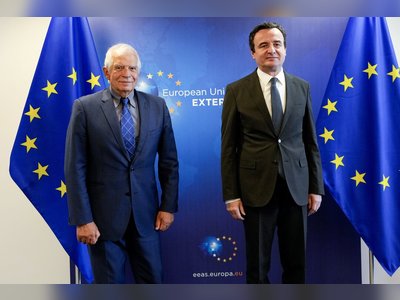Germany Tightens Border Control for Migrants Without Documentation
Interior Minister announces rejection of undocumented migrants at German borders amid rising immigration concerns.
Germany's Interior Minister, Alexander Dobrindt, has issued a directive rejecting entry for migrants lacking necessary documentation at the country's borders.
This announcement reverses a policy established in 2015 that allowed citizens from non-EU countries to enter Germany without documentation, a measure originally implemented during the height of the migrant crisis when hundreds of thousands sought asylum, many fleeing conflict in Syria.
Dobrindt stated that the decision aligns with efforts to reduce illegal immigration, citing that the number of migrants remains excessively high.
He emphasized the importance of clarity, consistency, and control in border management.
The coalition agreement between Chancellor Friedrich Merz's conservatives and the Social Democrats indicates that such actions should be coordinated with neighboring countries.
To bolster border enforcement, Dobrindt plans to deploy up to 3,000 additional police officers, increasing the total number of border police to approximately 14,000.
The policy change comes in response to rising concerns over crime involving migrants and the increasing support for far-right political movements in Germany.
Prior to federal elections in February, Merz committed to addressing immigration issues following public outcry over several violent incidents.
As part of the coalition's agreements, measures include rejecting asylum seekers at the borders, facilitating deportations to Syria, and halting family reunifications for migrants.
This legislative shift marks a significant departure from the more lenient immigration policies set during Angela Merkel's chancellorship, reflecting a broader trend in Europe towards stricter immigration controls amid ongoing debates about national identity and security.
This announcement reverses a policy established in 2015 that allowed citizens from non-EU countries to enter Germany without documentation, a measure originally implemented during the height of the migrant crisis when hundreds of thousands sought asylum, many fleeing conflict in Syria.
Dobrindt stated that the decision aligns with efforts to reduce illegal immigration, citing that the number of migrants remains excessively high.
He emphasized the importance of clarity, consistency, and control in border management.
The coalition agreement between Chancellor Friedrich Merz's conservatives and the Social Democrats indicates that such actions should be coordinated with neighboring countries.
To bolster border enforcement, Dobrindt plans to deploy up to 3,000 additional police officers, increasing the total number of border police to approximately 14,000.
The policy change comes in response to rising concerns over crime involving migrants and the increasing support for far-right political movements in Germany.
Prior to federal elections in February, Merz committed to addressing immigration issues following public outcry over several violent incidents.
As part of the coalition's agreements, measures include rejecting asylum seekers at the borders, facilitating deportations to Syria, and halting family reunifications for migrants.
This legislative shift marks a significant departure from the more lenient immigration policies set during Angela Merkel's chancellorship, reflecting a broader trend in Europe towards stricter immigration controls amid ongoing debates about national identity and security.
AI Disclaimer: An advanced artificial intelligence (AI) system generated the content of this page on its own. This innovative technology conducts extensive research from a variety of reliable sources, performs rigorous fact-checking and verification, cleans up and balances biased or manipulated content, and presents a minimal factual summary that is just enough yet essential for you to function as an informed and educated citizen. Please keep in mind, however, that this system is an evolving technology, and as a result, the article may contain accidental inaccuracies or errors. We urge you to help us improve our site by reporting any inaccuracies you find using the "Contact Us" link at the bottom of this page. Your helpful feedback helps us improve our system and deliver more precise content. When you find an article of interest here, please look for the full and extensive coverage of this topic in traditional news sources, as they are written by professional journalists that we try to support, not replace. We appreciate your understanding and assistance.










